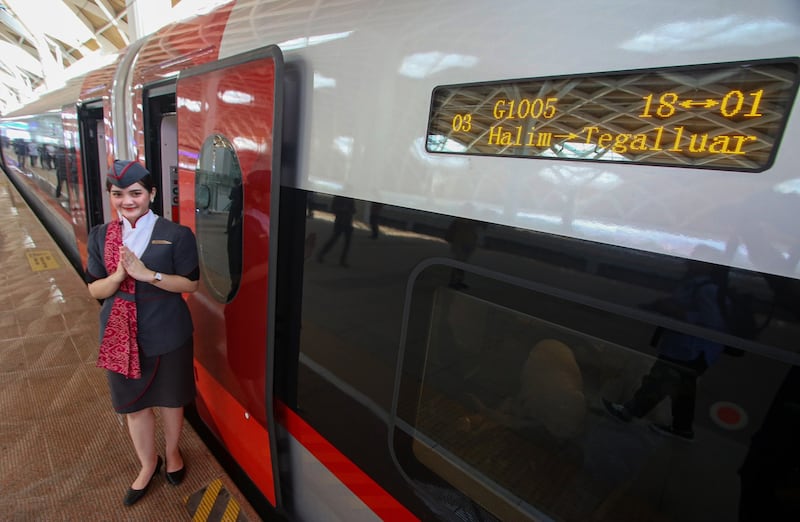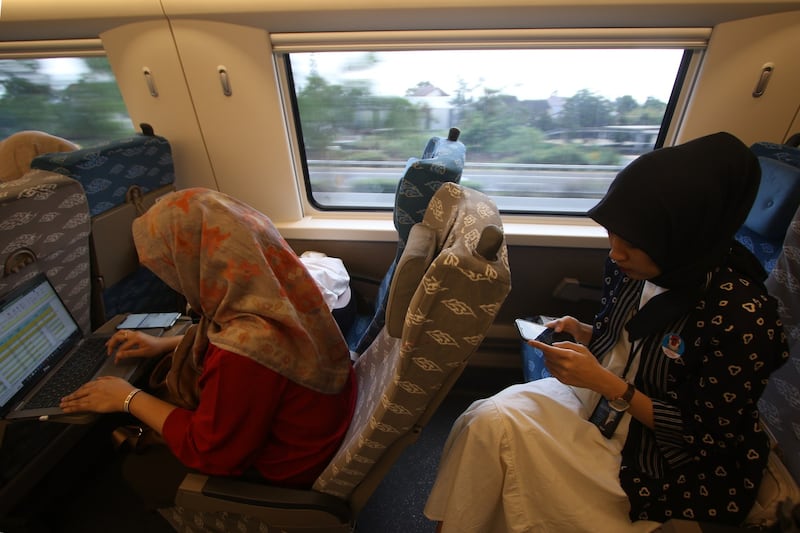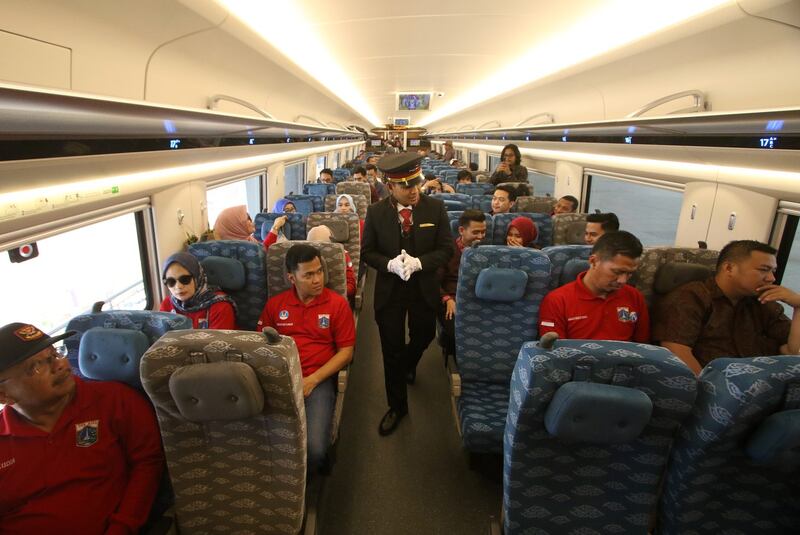Cepu Supriyanto used to dread the hours-long journey in traffic from Indonesia’s capital Jakarta to Bandung, a popular destination for domestic tourists.
That changed on Saturday, when he got a chance to ride Indonesia’s first high-speed train, built and funded by China, on its trial run.
“I had a lot of fun and felt very comfortable on the train,” said Cepu, an avid cyclist who was still in his cycling gear.
“I can now travel with my cycling friends from Jakarta to Bandung in the morning, do some cycling there, and return in the afternoon. It saves a lot of time and is very efficient,” he told BenarNews.
The Jakarta-Bandung high-speed train, a joint project between Indonesia and China, will start commercial operations on Oct. 1 after several delays and cost overruns since construction began in 2016.
Beijing has touted the high-speed railway as a symbol of the close ties between the two nations and the project underlines China's growing footprint in Southeast Asia.
Saturday’s ride was part of the public testing phase of the project, which will last until Sept. 30. During the testing phase, the service will operate four trips a day, with a capacity of 600 passengers per trip.

The ride was smooth and comfortable, with few bumps or vibrations.
Passengers cheered as the train reached the speed of 350 kilometers (218 miles) per hour during the 142-kilometer (88-mile) journey. There are four stations: Halim, Karawang, Padalarang and Tegalluar.
Travelers on board were also treated to a scenic view of the countryside, as the train passed through rice fields, hills, and tunnels.
It took only 30 minutes to travel from Halim station in Jakarta to Padalarang in West Bandung, compared with about three hours by car when traffic is smooth.
The train, which was fully booked for the test ride, is equipped with facilities such as power outlets, LCD screens, and spacious seats. The stations are new, with sleek designs and spacious lobbies, though some parts were unfinished.
“We feel very comfortable on the train. We can see how fast it is going,” said Muhammad Risman, a 48-year-old private employee from Jakarta who was taking the test ride with his wife.
“The seats are nice and spacious. The screens are also easy to see and show us what the route looks like.”

He also said that he did not mind paying the proposed fare of 250,000 rupiah ($16.3) to 300,000 rupiah ($19.5) for such a fast and convenient trip.
However, he also pointed out some challenges in reaching Bandung city from the last two stations.
“It would be even better if there was a connecting train to take us to the city center, or if they gave us some guidance on how to get there,” he said.
PT Kereta Cepat Indonesia China (KCIC), the consortium that built the railway, said feeder trains and buses will take passengers from the penultimate stop at Padalarang to the city center once the commercial operations are in full swing.
Development and debt
The project was financed by a loan from China Development Bank, which covered 75% of the cost, and equity from the Indonesian and Chinese shareholders, which covered the remaining 25%.
The railway was initially billed at $6 billion, but an extra $1.2 billion was needed to meet rising construction costs and land compensation.
Indonesian officials have said the project aims to boost economic development and connectivity. Jakarta, with a population of more than 10 million, is the political and commercial center of Indonesia, while Bandung, with about 2.5 million people, is a hub for education, culture and technology.
The railway is expected to generate revenues from passenger fares, advertising and property development along the route. However, some analysts have questioned the profitability of the project, given the low population density and income level of the areas it serves.
They have also warned of the risk of debt distress, as Indonesia has to repay the loan with interest to China.

President Joko "Jokowi" Widodo, who also rode on the train for the first time last week, expressed his admiration for the project.
“I had visited the high-speed train project site four times before, but this was the first time I actually rode on it. It was very comfortable, and I didn’t feel the speed of 350 km [per hour] at all, whether I was sitting or walking around,” Jokowi said.
“This is what civilization looks like.”
The Jakarta-Bandung high-speed railway is part of China’s Belt and Road Initiative (BRI), a global infrastructure development strategy that aims to connect Asia, Europe and Africa through a network of roads, railways, energy pipelines and ports.
It is also a showcase of China’s ambitions to export its high-speed rail technology and expand its influence in Southeast Asia. China has been competing with Japan, which has a long history of building bullet trains, for rail projects in the region.

The construction of the railway began in 2016 and was originally scheduled to be completed by 2019. However, it faced various challenges and delays due to land acquisition, environmental issues and the COVID-19 pandemic.
In October 2021, Jokowi decided to allow the government to share the cost of the project, contradicting an earlier pledge and decree in 2015 that prohibited the use of state funds for its construction.
Beijing has insisted on keeping the interest rate for the project loan, including the cost overrun, at 3.4%, despite Indonesia’s request to lower it to 2%.
Nevertheless, officials have said the government is studying plans to extend the railway from Bandung to Surabaya, Indonesia’s second-largest city about 700 kilometers (435 miles) away.
Trail of damage
Indonesia was one of the first countries to support the BRI when it was launched by Chinese President Xi Jinping in 2013. China is Indonesia’s largest trading partner and one of its main sources of foreign investment.
In addition to the railway, Indonesia has also participated in other projects under the BRI, such as power plants, industrial parks, ports and bridges.
Some of these have been criticized by environmentalists and local communities over their potential impacts on natural resources and human rights.
According to some locals, construction of the Jakarta-Bandung railway has left a trail of damage in the villages along its route. It has caused water scarcity, pollution and damaged houses for hundreds of villagers who have received little or no compensation from the company or the government, they said.
Didin Syafrudin, a community leader in Cikalong Wetan village, West Bandung, said the community’s well water used to be abundant and clear before the project.
“The impact of this high-speed train project was not felt immediately. For example, the clean water that we used to use as much as possible for drinking or washing clothes became less and less until it disappeared completely,” he said.
“KCIC has not done anything to replace the water for the affected villagers, even now [when the project] is about to be inaugurated,” he told BenarNews.
KCIC did not respond to requests for comment from BenarNews.
China and Indonesia have defended their BRI cooperation as mutually beneficial and sustainable.
BenarNews is an RFA-affiliated news service.
